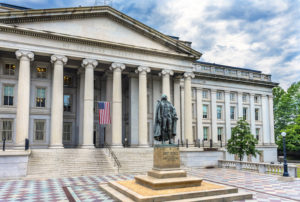
President Trump signs rollback of Dodd-Frank into law, the Supreme Court rules that employment agreements can bar class actions, and more…
IN THE NEWS
- By a 258-159 vote, the U.S. House of Representatives approved a rollback of part of the 2010 Dodd-Frank Wall Street Reform and Consumer Protection Act passed after the financial crisis of 2008. The rollback is intended to ease restrictions on some banks and was already approved by the U.S. Senate in March 2018. Dennis Kelleher, president of Better Markets, reportedly stated, “With bank revenue, profits, bonuses and lending all on the rise, if not breaking records, the claimed basis for deregulation has been objectively proved without merit.” The rollback was signed into law by President Donald Trump.
- The U.S. Supreme Court ruled that agreements barring employees from joining in arbitration or class-action lawsuits are enforceable under the Federal Arbitration Act. “Congress has instructed that arbitration agreements like those before us must be enforced as written,” wrote Justice Neil Gorsuch for the majority. In dissent, Justice Ruth Bader Ginsburg categorized the decision as “egregiously wrong,” stating that “the inevitable result of today’s decision will be the underenforcement of federal and state statutes designed to advance the well-being of vulnerable workers.”
- The Federal Communications Commission (FCC) has reopened comment on Sinclair Broadcast Group’s proposed acquisition of Tribune Media following updates to the companies’ consolidation and divestiture plans. The companies have asked for the FCC’s consent to combine two top-four rated television stations and to sell other television stations to third parties. The public may comment on the transaction until July 12.
- U.S. Environmental Protection Agency (EPA) Administrator Scott Pruitt proposed a rule that seeks to reduce risks and improve responses to chemical accidents. Pruitt said that “accident prevention is a top priority at EPA, and this proposed rule will ensure proper emergency planning and continue the trend of fewer significant accidents involving chemicals.” Emma Cheuse of the environmental group Earthjustice criticized the proposal as “aiming to weaken safety measures instead of protecting the lives and health of the American people.”
- The U.S. Court of Appeals for the D.C. Circuit announced it will livestream audio of all oral arguments except when classified or sealed matters are discussed. “This is an important additional step in bringing transparency to our proceedings,” Chief Judge Merrick Garland said. With its decision to livestream cases, the D.C. Circuit joins the U.S. Courts of Appeals for the Fourth and Ninth Circuits.
- National Football League (NFL) Commissioner Roger Goodell issued a statement that “all league and team personnel shall stand and show respect for the flag” and that teams will be fined if players kneel during the national anthem. The statement also announced an amendment to NFL rules eliminating the requirement that all personnel be present on the field for the anthem. The NFL Players Association stated that it was not consulted on the policy and that it will “challenge any aspect of it that is inconsistent with the collective bargaining agreement.”
- By a 250-179 vote, the U.S. House of Representatives approved the Right to Try Act of 2017, which would allow certain terminally ill patients to request access to experimental drug treatments. The U.S. Senate approved the measure in August 2017 and President Trump indicated his support for the legislation in his January 2018 State of the Union address.
- The House Transportation and Infrastructure Committee approved the Water Resources Development Act of 2018, a biennial bill that would authorize the Army Corps of Engineers to maintain the nation’s water infrastructure. Committee chairman Bill Shuster (R-PA) emphasized the importance of the bill, stating that “this is infrastructure that strengthens our global competitiveness, grows the economy and creates jobs.” The bill’s approval comes a day after the U.S. Senate Committee on Environment and Public Works passed the America’s Water Infrastructure Act of 2018 in a unanimous vote.
- The Monetary Authority of Singapore (MAS) proposed a regulatory framework that would ease requirements on new business models of trading platforms, including those using the blockchain technology best known for launching bitcoin. MAS’s current framework differentiates market operators—platforms for trading on stock or financial markets—based on whether they are systemically important. Those that are not, which may include blockchain-based platforms, will be subjected to reduced capital and technology risk requirements under the proposal for the purposes of encouraging market entry.
WHAT WE’RE READING THIS WEEK
- Could the U.S. Operational Safety and Health Administration (OSHA) regulate the National Football League? “Clearly,” according to Adam M. Finkel of the Wharton School at the University of Pennsylvania and University of Michigan School of Public Health and coauthors in an article for the Arizona Law Review. But OSHA has almost never regulated professional sports, according to Finkel and his coauthors. Therefore, Finkel and his coauthors imagined a world where OSHA treats the NFL like any other workplace—particularly in the context of regulating brain injury—and called on OSHA to brings its expertise to the public health issues of professional football.
- Harry Arthurs of Osgoode Hall Law School at York University in Canada explored the disruptive effects of the sharing economy and potential regulatory solutions in a recent paper. Arthurs wrote that new sharing companies have been largely successful in subverting regulation thus far because “corporations have learned to pose as friends of the working class, or to persuade its erstwhile members that their primary identity is as consumers, rather than as producers.”
- In an article for the Georgetown Immigration Law Review, Lori A. Nessel of Seton Hall University School of Law discussed how immigration law and executive power can create heightened fear for immigrants. Nessel examined the history of immigration law and the Supreme Court’s deference to the other branches of government on immigration matters. Nessel argued that the goal of instilling fear has always been present in U.S. immigration policy.



